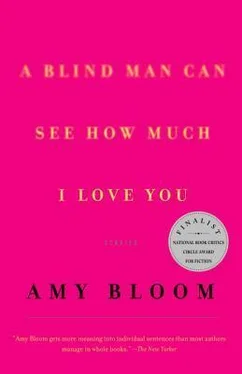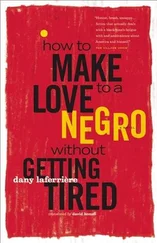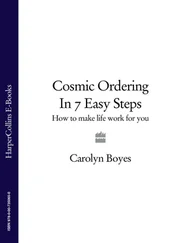The Taxol drips steadily for three and a half hours, from an old-fashioned glass bottle, solid and pale blue. All the other stuff drips from Jetson-style packets, flimsy and benign. Taxol is a heavyweight in an upside-down jug, one fat bubble at a time floating up to the undersurface, entering the transparent slice of silver bubbles before it is bumped aside by the next rising bubble. Charley will be at Fishers Island by the time the Taxol is gone, making food that Mai will not eat. Ellie will eat the lamb kabobs at midnight, will eat the shepherd’s pie or crab cakes for lunch, while Mai sips ginseng tea and eats barbecue potato chips.
Ellie drives them onto the ferry, and they sit in the car for the entire crossing. Mai leans her head back, and although she is always beautiful to Ellie, even Ellie can see that she looks bad. There’s nothing wrong with bald babies; everything about them, even the ugly ones, is made to be revealed, and every feature is nicely in proportion to their big, satiny heads. Every time Ellie looks at Mai, she misses her silver-blond braid and is grateful that her eyebrows, narrow gold tail swipes, have held on. Mai’s naked head has a pair of dents halfway up the back, and a small purplish birthmark behind the left ear, and although her skin has always been amazingly soft and poreless, the disappearance of even her fine body hair is a little jarring to both of them. They know each other’s pubic hair and leg-shaving rituals and scars, completely and without comment. Ellie is furry and tan, Mai is smooth and white. But smooth is one thing, Mai says, egg is another.
When Mai and Ellie studied the wig catalogue, before going for the high-end, handmade, real-hair wigs that are brought to your house, and then to your hairdresser for final adjustment, Mai contemplated auburn pixie cuts and platinum bouffants and even a long jet-black pageboy, parted in the middle à la mid-career Cher. Charley walked in and out four times while they flipped through the catalogue, and finally he called Mai into the bedroom so he could speak to her privately.
“I don’t think you need a wig,” he said.
It is love, of course, that makes Charley tell Mai that no wig is necessary, that he likes her bald and odd, and that no pretense is called for, or even tolerable, between them. It is love that he intends to convey.
“Okay. I’ll see.” I’m an intelligent woman, Mai thinks, how did I marry the village idiot? After twenty years, during which you have presumably been paying some kind of dim attention to the kind of person I am, how could you imagine that I would want to parade around my own home grotesque and vulnerable? Do you think, would thinking at all lead you to believe that it would somehow please me to have you now be kind about my appearance?
“It might be fun to experiment. I’ve never been an exotic brunette — this could be your last chance,” Mai says.
Charley does not want an exotic brunette. He wants his cool, white, lanky wife back, with her normal spicy smell and her pale silky hair pulled into a smooth knot. The thought of her suddenly appearing in public with her chemically puffed face and a witch’s wig makes him miserable, and so ashamed of his pettiness that he wishes Mai were completely healthy or dead.
“Whatever you want. Maybe it will liven things up around here.” They have not made love since Mai was diagnosed.
“Maybe. Don’t hold your breath.” The privilege of cancer is that Mai is allowed to close her eyes, as if she is all worn out from surgery and chemo, and not look at Charley’s lonely, frightened face.
Charley puts his hand on Mai’s shoulder, although he thinks it may be the wrong thing to do, and she stiffens. He pulls his hand back and Mai pulls it forward, wrapping his arm around her neck. She lays her warm, inflated cheek against his skin.
“I like you very much,” she says.
“I like you very much too.”
They hear Ellie’s heavy, quick step before they see her, and they are a couple again, even before she announces that she has, as always, burned the contents of whatever pan Charley has left unattended. This happens so often not even Charley thinks it’s an accident. He believes that Ellie should learn how to cook. Mai can cook, of course, not that she has ever needed to, having been the most beautiful girl at college, being the only beautiful and brilliant woman Charley knows. But Ellie should learn how to cook, and if Charley followed his own thoughts, they would lead to Ellie cooking and fussing sweetly, as she does for Charley at times, and somehow, under his tutelage, revealing to herself, and then to some nice man, her hidden, heterosexual, marriageable self.
Ellie does cook. At home she cooks for friends who have never met Charley and Mai. She cooks, very well, from M.F.K. Fisher and Bobby Flay and Alice Waters, for friends who would find it hard to believe that she ever wore a mint green sheath and three-inch dyed-to-match heels for Charley and Mai’s Fishers Island wedding, the spikes digging into the lawn, a rose-covered veranda in front of her and Block Island Sound behind. Mai stood like an angel on treetop, sleeveless white silk to her ankles, plain white ballet slippers on her narrow feet, and three luminous ropes of plain white pearls, donated with great affection and expectation by Charley’s grandmother, one of the Fishers Island Cushings. Charles Cushing stood beside his new wife, beaming, sunburned, and slightly giddy at having escaped a future of dating Cushing cousins’ friends, Cushing cousins’ friends’ sisters, and the huge net of Cushing friends of friends.
At Fishers, where they now have a small house of their own, Charley is the chef, but when he goes back to New Haven, Ellie and Mai eat kitchen-sink omelets, microwave popcorn tossed with grated Parmesan and kosher salt, peanut butter out of the jar. They drink Red Stripe beer and smoke exactly five cigarettes apiece, burying the butts out by the Cushing family pet cemetery, home to four generations of chocolate Labs, white Persians, and Charley’s own late cocker spaniel. The graves are not marked with “Dearest Companion” headstones, too baroque and eccentric for the Cushings, the sort of thing they imagine Italians might do; nor are they unmarked, as if it doesn’t matter that the little bodies are there, as if commemoration is unnecessary. Each of the twelve plots sports something both woodsy and distinct: a large chunk of mica-flecked stone, a wreath of barbed wire tamped down into the soil, and, for Charley’s Pogo, a toy sailboat lashed to a two-inch dowel. It is more gushing sentiment than Ellie has seen in twenty years of Cushings, and as she stands in the cemetery, carefully placing her cigarette under the chunk of granite over Queen of Sheba, she likes Charley right then more than she sometimes does in person, and remembers the big-eared boy he was at college as if he’d been her friend and not a source of fond, irritated puzzlement and occasional drunken entertainment. It was with Charley, not Mai, that Ellie dressed the comatose football captain in drag and tied him to his bed; it was Charley and Ellie wading through Thomas Hardy and toasting marshmallows while Mai and Ellie’s girlfriend skied Mount Snow until dark; and even now it is Charley and Ellie dancing for hours at endless Cushing weddings and anniversaries. Products of two very different but effective dance instructors, they move well together; Charley leads more firmly than Ellie would have thought, and she follows him neatly, as if she’d been beside him at Junior Dance Assembly, hearing his Miss Elizabeth say, again, “The gentleman is the frame, ladies, you are the picture.” Mai sits out with Charley’s sharp-eyed father, and they talk about island real estate, politics, and indiscretions. Mr. Cushing cannot talk to Charley, who cooks and dances, but he likes his clever, pretty daughter-in-law more than almost anybody.
Читать дальше












